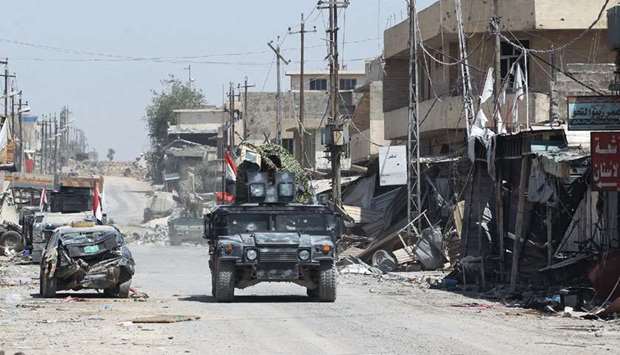The Iraqi army and tribal fighters have dislodged Islamic State from the Al Waleed border crossing into Syria, an Iraqi military statement said yesterday.
The capture of Al Waleed removes Islamic State fighters from the vicinity of a US base located on the other side of the border, in Syrian territory.
Aircraft from the US-led coalition and the Iraqi air force took part in the operation, the statement said.
Al Waleed is close to Tanf, a strategic Syrian border crossing with Iraq on the Baghdad-Damascus highway, where US forces have assisted Syrian rebels trying to recapture territory from Islamic State.
US forces have been based at Tanf since last year, in effect preventing Iranian-backed forces supporting Syrian President Bashar al-Assad from receiving heavy weaponry from Iran by using the main highway between Iraq and Syria.
The involvement of Iraqi tribal fighters in the operation to dislodge the militants from Al Waleed is another indication that Iran will not yet be able to use the highway.
Pro-Assad forces in Syria, mainly comprising Iraqi Shia militias, last week reached the Iraqi border north-east of Tanf, potentially preventing the US-backed rebels from taking more
territory from Islamic State alongside the border area with Iraq. In Mosul, where a US-backed offensive against Islamic State yesterday entered its ninth month, the militants have been squeezed into an enclave on the western bank of the Tigris river.
Islamic State also controls territory along the border with Syria and urban pockets west and south of Mosul.
In Syria, the US-backed Syrian Democratic Forces, made up predominantly of Kurdish fighters, have seized territory to the north, east and west of Raqqa, Islamic State’s Syrian bastion.
About 100,000 civilians remain trapped in harrowing conditions behind Islamic State lines in Mosul, with little food, water and medicine and limited access to hospitals, the United Nations refugee agency UNHCR said on Friday. Islamic State snipers are shooting at families trying to flee on foot or by boat across the Tigris River, as part of a tactic to keep civilians as human shields, it said.
Iraqi government forces regained eastern Mosul in January, then a month later began the offensive on the western side that includes the Old City, a dense maze of narrow alleyways where fighting is mainly done house by house. The fall of Mosul would, in effect, mark the end of the Iraqi half of the “caliphate” that Islamic State leader Abu Bakr al-Baghdadi declared in a speech from an historic mosque in the Old City three years ago, covering parts of Iraq and Syria.

Iraqi forces, consisting of the federal police and the elite Rapid Response Division, patrol in the Shifa neighbourhood, on the west bank of Mosul, yesterday.
